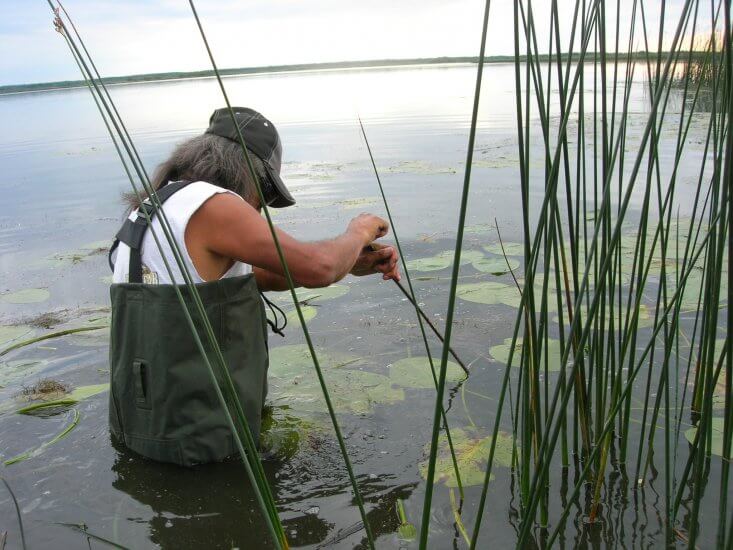Study bridges Traditional Indigenous Knowledge, Western science
Athabasca University researchers partner with Bigstone Cree Nation to study impact of human activity and industry on aquatic health in northern Alberta
A partnership between Bigstone Cree Nation and Athabasca University (AU) researchers will help bridge the gap between Indigenous Ways of Knowing and the traditional way science research is done.
Dr. Shauna Zenteno, microbiologist and dean of the Faculty of Science and Technology, and Dr. Janelle Baker, an assistant professor of anthropology in the Faculty of Humanities and Social Sciences, are collaborating with Bigstone Cree Nation on a project examining the potential impact of human activity and development on aquatic health in northern Alberta at a microbial level. This project will combine the qualitative observations Bigstone members have made with a quantitative metagenomics analysis of what’s happening in the water.
“We feel that changes to the water biodiversity due to human activity may trigger long-term impacts on plants and animals, which affects food security for First Nations communities,” Zenteno said. “Bacteria are essential to many processes that support ecosystem health and can sense and respond to environmental changes rapidly. An imbalance has potential downstream impacts on water, plant, and animal health. Bigstone Cree Nation is particularly interested in water quality and moose health.”

This work is supported with an infrastructure grant from the John R. Evans Leaders Fund administered by the Canadian Foundation for Innovation. It helps build on similar work Baker has done with the community over the past decade.
Baker studies issues of wild food contamination in collaboration with Bigstone members and has seen first-hand some of the changes community members have observed in the area and spoken about.
Imagine a member of Bigstone Cree Nation harvesting a moose on their traditional territory in northern Alberta. They clean and dress the animal, preparing the meat to sustain their families in much the same way as their ancestors have done for thousands of years.
But not everything is the same as it has been in the past, something Baker has observed while working with members of the First Nation.
“I’ve been out hunting and have seen cysts in the livers of moose, which community members have been telling me about,” she said. “Now they’re able to sample the liver right there, and send it for testing.”
The need for Traditional Indigenous Knowledge
Baker also knows the frustration of seeing Traditional Ways of Knowing dismissed in the context of scientific research.
“For me as a cultural anthropologist, and someone with maternal Métis ancestry, I get really exhausted with the dismissal of the knowledge and wisdom of people who have been on the land their entire lives hunting and observing those changes,” she said. “Population dynamics, habitats, and species’ behaviour are just so incredibly nuanced.”
This is in contrast with what Baker and many others have observed in the past. For example, when researchers come into a First Nations community to study a species—say a type of fish or a particular plant—they may visit specific locations in the bush based on data gathered from maps. This data is processed in a computer lab somewhere, sometimes with inconsistent results.
Meanwhile, community members and elders who rely on those species for food and medicine, and have done so for generations, know from experience exactly where to find those species.
Community partnerships
Both Baker and Zenteno emphasized the importance of having community members take a lead role. That way, the process of making observations and applying Traditional Knowledge aren’t done separately from the scientific work that produces quantifiable data about what’s happening in the systems being studied.
“The Traditional Knowledge and community members themselves help guide the research,” Zenteno said. “Their understanding of the environment and observations over time can help us interpret the data we obtain on water quality and how this relates to our findings in moose.”
Bigstone Cree Nation members, who are being trained to sample water and organize moose kits, are the environmental monitors for this research. They also interview elders and community members as part of the AU course Anthropology 390: Community-Based Research Methods. These activities are funded from an Indigenous community-based monitoring grant funded by Environment Canada titled “What is in the Water?”
While water is monitored, sampled, and sequenced for analysis, moose kits are collected from hunters as part of the meat-harvesting process. Sequencing and bioinformatics to assess water quality is conducted in collaboration with Dr. Tarah Lynch, and tissue analysis and toxicology are performed by Dr. Susan Kutz, both from the University of Calgary. This is all in connection to the Traditional Knowledge being gathered from the community and documented.
But ultimately, as much as this project is about understanding what’s happening in northern Alberta aquatic systems at a microbial level and how this impacts the health of moose, it’s also about nurturing long-term relationships.
“It’s not just about going and doing some sampling and then leaving. I have lifelong relationships and obligations to this community,” Baker said, adding she was able to develop these relationships in no small part than to the support of Bigstone Cree Nation member and fellow AU professor Dr. Josie Auger.
Zenteno said from her perspective, one of the most important goals of the project is not only environmental sustainability, it is about creating capacity, and supporting data sovereignty to ensure the community has ownership of that data.
“Helping to understand the reliance of Western science on Traditional Knowledge is incredibly rewarding,” she said.